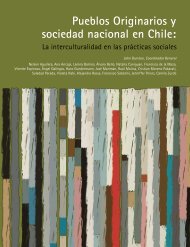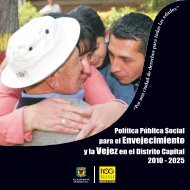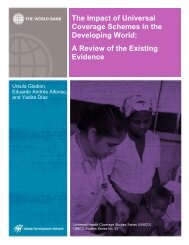11ZAQGM
11ZAQGM
11ZAQGM
You also want an ePaper? Increase the reach of your titles
YUMPU automatically turns print PDFs into web optimized ePapers that Google loves.
money and labor to repairs. Community members are also driven<br />
to strain local forest resources through the clearing of vegetation<br />
and destruction of the natural landscape for the construction of new<br />
roads, fields or irrigation canals, further degrading the land.<br />
Dependence on agriculture<br />
The agricultural practices and techniques employed by the<br />
community today are largely unchanged from those of their<br />
ancestors. Fields are terraced and water is sourced via an openair<br />
irrigation ditch that spans three kilometres across a steep<br />
mountainside. The source of water is a river shared by three<br />
communities on a rotational schedule. Historically, water rights have<br />
been a major source of conflict between neighboring villages, even<br />
leading to occasional physical confrontations between families.<br />
Currently, each community is allowed a certain, limited period each<br />
day to use the river. Clearly, even in the absence of the threats posed<br />
by climate change, water is a very limited resource in the region.<br />
As a farming community, dependent on agriculture, Douar Elmoudaa<br />
is particularly vulnerable to the impacts of unpredictable rainfall<br />
patterns and variations in temperature. Unusually hot or cold seasons<br />
drastically impact crop yields, which in turn affect both the food and<br />
economic security of community members. Community members<br />
have observed an increasingly poor quantity and quality of harvest,<br />
primarily stemming from increasing erosion and land degradation<br />
issues, which are exacerbated by an inefficient and wash-out prone<br />
irrigation line, increased weather variability, insufficient knowledge<br />
of new adaptive agricultural technologies, and poor natural resource<br />
and water conservation techniques.<br />
Poor harvests are beginning to dramatically alter the social and<br />
structural fabric of Elmoudaa, as families are forced to seek alternative<br />
means of income generation. The result is an exodus of young men to<br />
the larger cities in search of work. Adult men are already in the minority<br />
in Elmoudaa, and their social and work responsibilities are either left<br />
unoccupied or passed on to women or children. The consequences<br />
of this additional burden on women and children are threatening the<br />
quality of life of many community members. Girls and young women<br />
are frequently forced to leave school early in order to attend to family<br />
needs, further entrenching themselves in a cycle of dependence and<br />
poverty. Although it provides a valuable source of income, the exodus<br />
of young men from the village weakens the human resource base of<br />
the village and leaves the community ill-equipped to deal with the<br />
increasing incidences of infrastructural damage.<br />
The challenges faced by the village are exacerbated by its isolation<br />
which limits the community’s access to education and healthcare,<br />
further increasing its vulnerability to the effects of climate change.<br />
Amsing Association<br />
Amsing Association was originally formed in 2001 by members of<br />
Douar Elmoudaa in order to contribute to the development of the<br />
village and, in particular, to protect the natural resources critical to<br />
local livelihoods in a context of infrastructural isolation and harsh<br />
climate. It was re-established in 2010 with the mission to ‘fairly and<br />
openly govern the community of Douar Elmoudaa while promoting<br />
activities and projects that improve the lives of community<br />
members and support environmental health’. This association<br />
represents the interests of all members of the Elmoudaa community,<br />
with all the village families represented in the association, usually<br />
by an adult male representative. The association is governed by<br />
a democratically-elected president, vice-president, secretary,<br />
treasurer, and two assistants. Although the Sheikh is the local leader,<br />
Amsing Association makes its decisions as a group, with members<br />
sitting together and discussing the potential of each proposed<br />
project.<br />
Later, community members formed a separate water management<br />
committee in order to benefit from subsidies available through the<br />
Moroccan Agriculture Strategy known as the ‘Moroccan Green Plan’.<br />
The new water association is responsible for overseeing all water<br />
use and management issues in the community as well as serving<br />
as the primary leadership behind all new technologies, projects,<br />
and training related to irrigation, domestic water use and all water<br />
rights. On this committee, the community elected to give women<br />
and youth unprecedented leadership positions (a significant step<br />
in this traditional community where men traditionally dominate in<br />
the governance of the affairs of the village). Both segments of the<br />
population take active roles in project design and implementation,<br />
as well as project management. Youths have taken the majority<br />
of leadership responsibilities in the new association, with no<br />
administrator over the age of 40.<br />
In 2011, the water management committee merged with the older<br />
association to form the current Amsing Association, which oversees<br />
the community-based adaptation (CBA) programme currently being<br />
implemented in the village. The presence of a youthful leadership<br />
ensures the sustainability of new practices and knowledge while<br />
ensuring the inclusion of local youth in the initiative.<br />
“Community leaders should be confident in promoting the tools and propositions that<br />
work best for their communities. They might be recognized later by decision makers<br />
as the best solutions.”<br />
Mr Said Zirri, President, Amsing Association<br />
23






